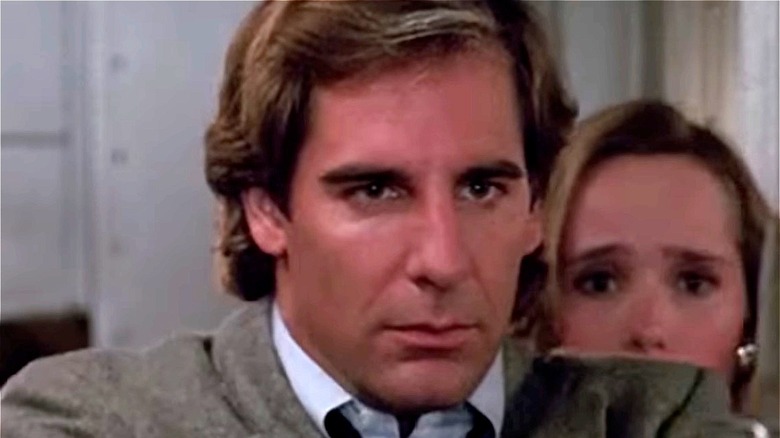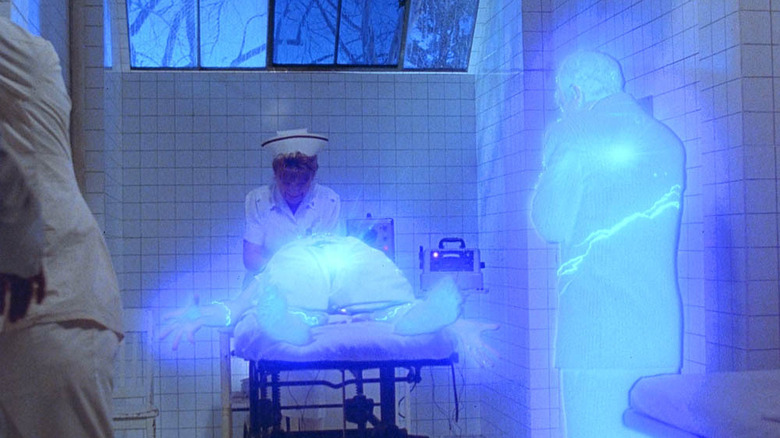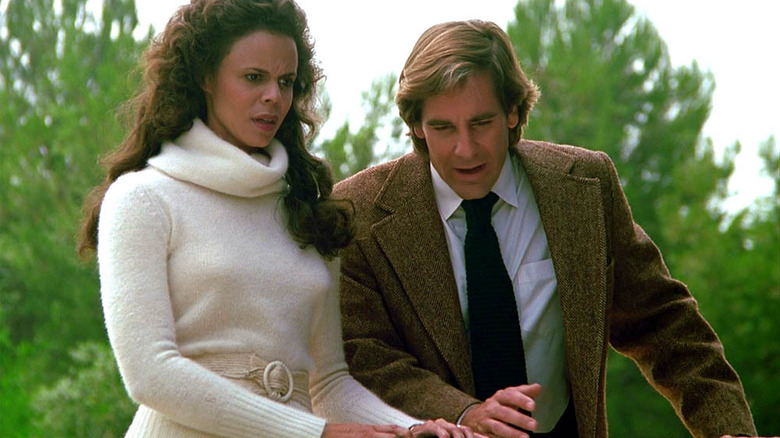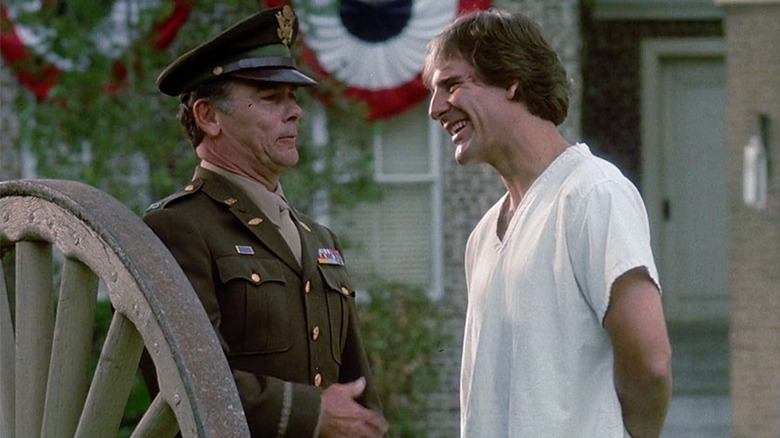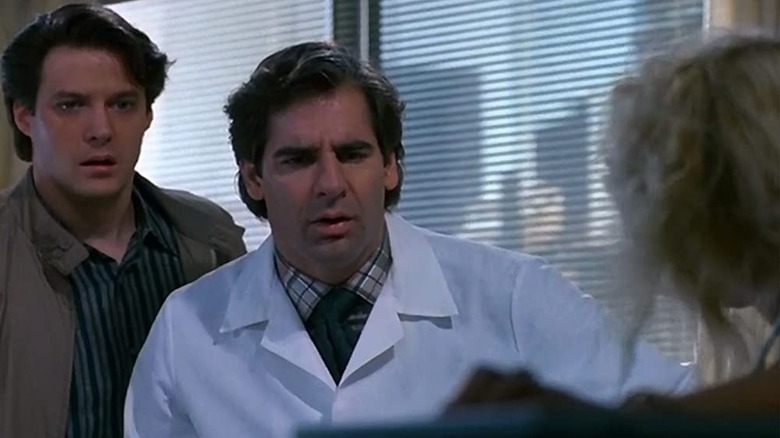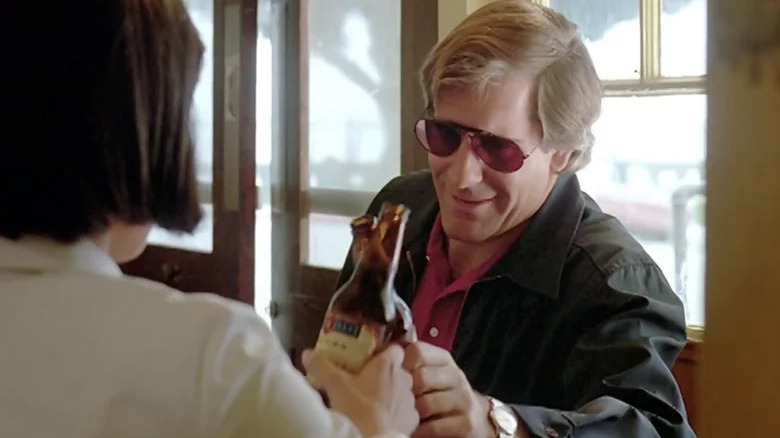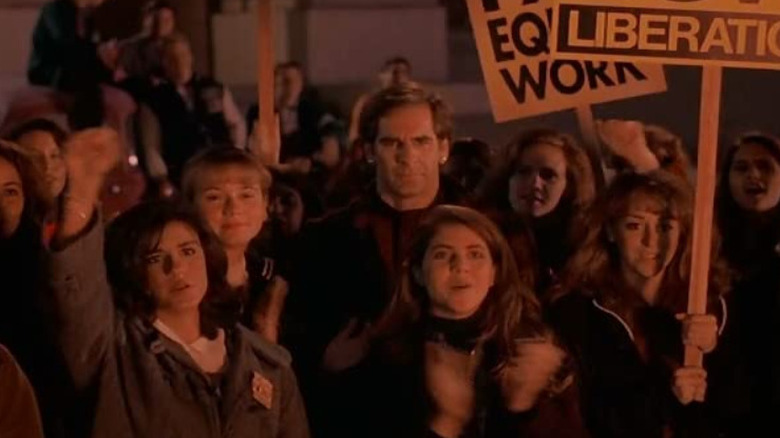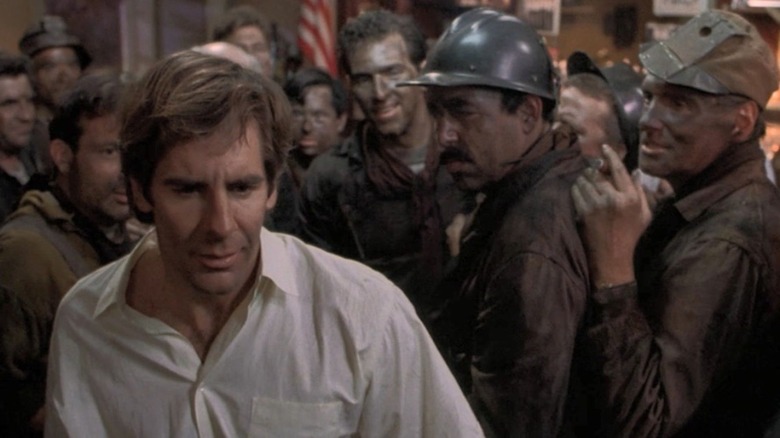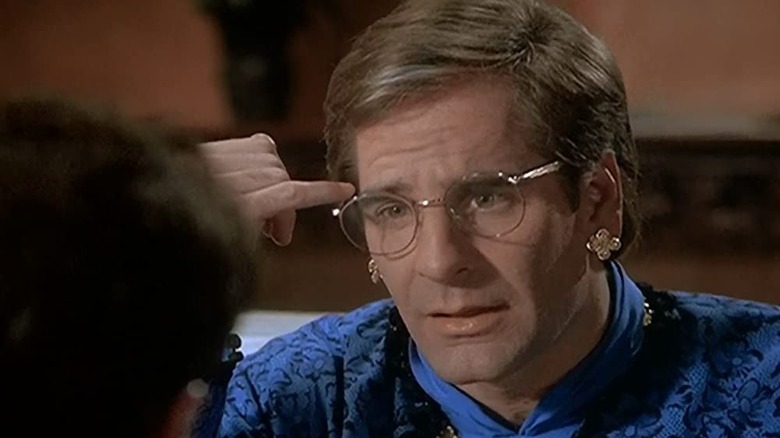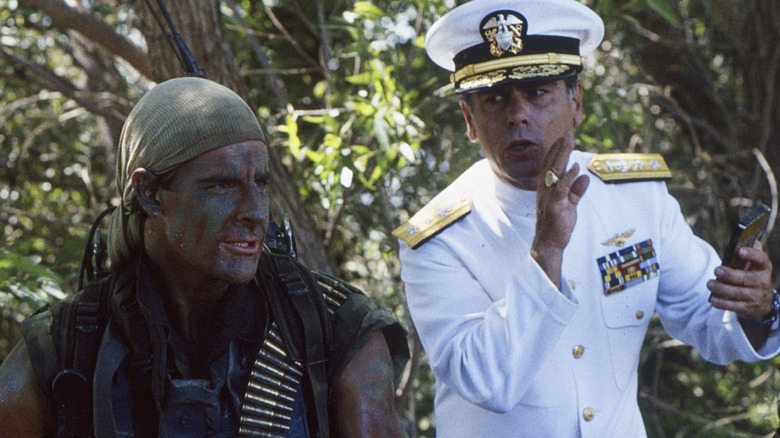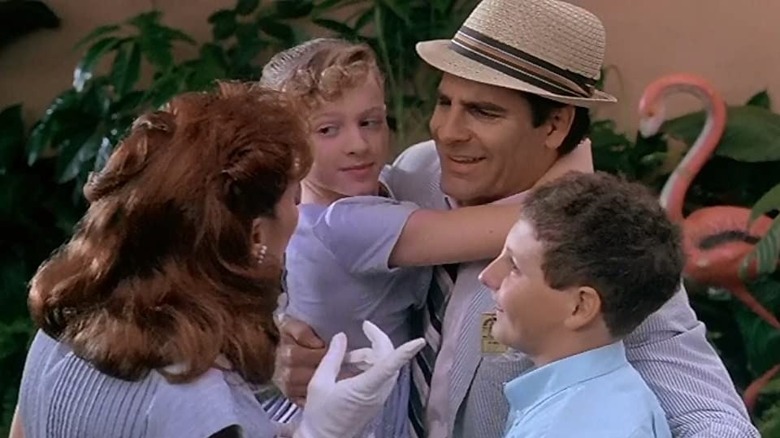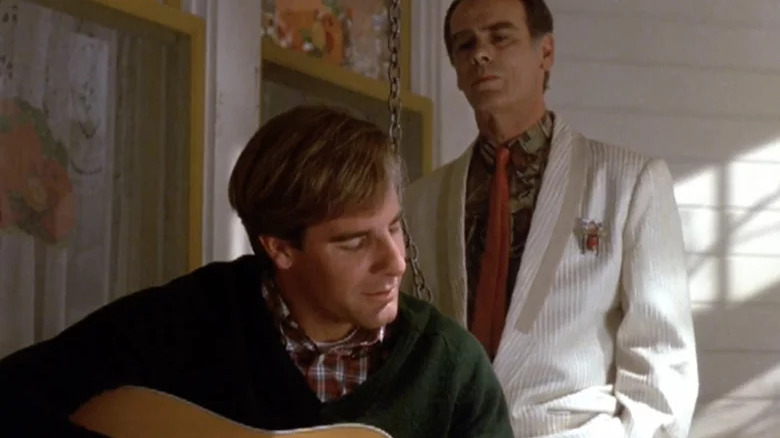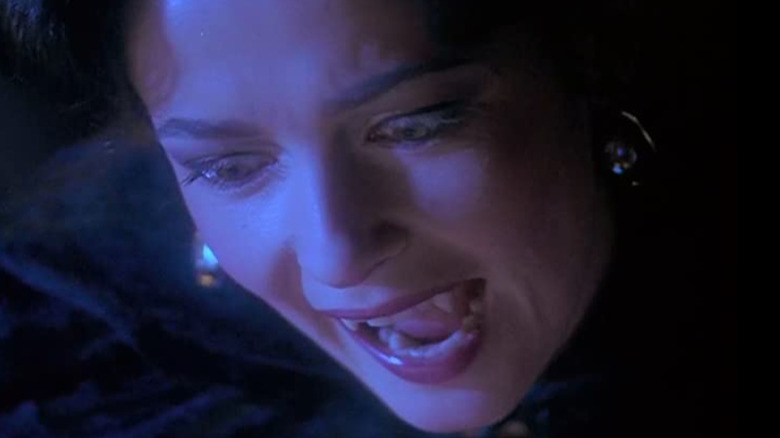The Best And Worst Episodes Of Quantum Leap
In 1989, Creator Donald P. Bellisario gave us the American science fiction cult classic "Quantum Leap" featuring the wide-ranging adventures of brilliant physicist — and partial amnesiac — Dr. Sam Beckett. Sam hops from time to time and body to body, trying to right past wrongs with the assistance of his guide and friend, Admiral Al Calavicci. He does all this while holding out hope that "his next leap will be the leap home," as the opening narration tells us.
As a product of the late '80s and early '90s, the special effects look a little silly by today's standards, and the show's internal logic is sometimes questionable. Still, the series has never really been about the science of it all. Rather, it's always been about empathy and compassion. At its core, "Quantum Leap" is a heartfelt time-traveling saga brimming with social commentary and — at its best — compelling personal narratives. In that way, it's not hard to see why, even years after the show's abrupt cancellation, it's still so beloved.
Now, fans can rejoice in the fact that NBC has officially greenlit a reboot (via Deadline)! As TVLine's Michael Ausiello notes, Scott Bakula's potential involvement remains unclear, but the actor has said before that "Sam's still out there" (via The Blast), and we can at least hope he'll be found again someday soon.
So, to celebrate this welcome and long-awaited reboot news, we've compiled, with IMDb as our guide, a list of the best and worst episodes of "Quantum Leap."
Best: Shock Theater - October 3, 1954 (Season 3, Episode 22)
In "Shock Theater," Sam (played by the ever-charming Scott Bakula) leaps into the depressed Sam Beiderman just as he's receiving some unsanctioned electro-shock therapy, courtesy of a sadistic orderly, during his stay at a psychiatric hospital. The trauma disorients Sam so completely that his already swiss-cheesed memories scramble even more while his mind fractures. When Sam comes to, he believes he's Samantha Stormer, a young woman he once leapt into. Then he thinks he's Jesse Tyler (from the first season episode, "The Color of Truth"). And so on.
With the doctors convinced Sam's experiencing the onset of a personality disorder, and with Sam incapable of helping anyone — including himself — Al must be the one to "fix what once went wrong." Fortunately, the patients can actually see him in his hologram form, which makes teaching another hospital resident how to read a little easier. The not-so-easy part? Staying tuned to Sam's frazzled brain waves so that Project Quantum Leap doesn't lose its head physicist forever.
A few respondents to Redditor u/Mourse1701's post, which asks for everyone's top "Quantum Leap" episodes, named "Shock Theater" as among their absolute favorites. It may come across as a little dramatic for some, as this entry focuses almost solely on Sam's suffering, but Tor's Alyx Dellamonica suggests that fans enjoy it as "an opera" and appreciate that it's "laden with big outbursts, teary reunions, and perils both real and psychic." Basically, the visceral emotion is the entire point.
Worst: A Portrait for Troian - February 7, 1971 (Season 2, Episode 11)
There's no denying that "A Portrait for Troian" is a unique narrative. In fact, Gizmodo's Cheryl Eddy essentially calls the storyline "Dark Shadows" meets "Scooby-Doo" — "Quantum Leap" style, of course. However, while writers like Dusty Reviews consider it "spooky" and "well-done," others, like Patrick J Mullen, rate the installment a dismal 5 out of 10 and label it "odd."
In this Season 2 episode, Sam leaps into the body of parapsychologist Timothy Mintz (Donald P. Bellisario), a man out to prove the existence of the supernatural while also trying to help the wealthy Troian Claridge (Deborah Pratt) make contact with her late husband, Julian. Turns out, Julian drowned in the lake by the property three years prior, and Sam must prevent the haunted widow, who is convinced her husband's been calling to her from beyond the grave, from meeting the same horrific fate. Throughout the episode, our characters are witnesses to strange and bizarre events, but in the end, no one's quite ready for the truth behind the mystery.
Notably, the episode incorporates a real-life historical event: the 1971 Sylmar Earthquake. Ultimately, even though it still earns a respectable score on IMDb, "A Portrait for Troian" is still considered a bottom-of-the-barrel episode for "Quantum Leap." Perhaps the tiresome arguments between a skeptical Sam and an increasingly disturbed Al over whether ghosts are actually real might be one of the reasons why.
Best: The Leap Back - June 15, 1945 (Season 4, Episode 1)
"The Leap Back," rated in the high 8s on IMDb, picks up right after the second season finale, where we see both Sam and Al leaping thanks to the combination of another high-voltage electro-shock therapy session and a timely strike of lightning. After the two men orient themselves, they find they've switched roles, with Al physically in 1945 and Sam stuck in the holographic chamber in his own time. While Al starts losing details about his life — like his last name — Sam starts to recall everything, devastated to remember he's been a married man all this time. We even enjoy a clearer glimpse of Sam and Al's present time here, meeting oft-mentioned characters like Gooshie (Dennis Wolfberg), Tina (Gigi Rice), and Ziggy (the sentient hybrid-computer prone to depression).
However, that all takes a backseat to the fact that it's now Sam's turn to help Al, who's leapt into the body of Captain Tom Jarret, a man just returning home after surviving a Nazi-operated prisoner-of-war camp. Acting as Tom, Al asks the man's love, Suzanne, to marry him, but the act drives another jealous suitor toward a murderous plot against the couple. To save his friend, Sam might have to give up the life he's only just come back to.
Redditor u/NineteenthJester considers this one "heartbreaking." Ultimately, it's so engaging and effective because it's one of the most personal stories that "Quantum Leap" ever told.
Worst: Moments to Live - May 4, 1985 (Season 4, Episode 19)
The Season 4 episode, "Moments to Live," which Patrick J Mullen rates a 6 out of 10 on Medium, follows Sam as he leaps into the body of Kyle Hart just before the soap opera star is abducted by crazed fan Norma Jean Pilcher (Kathleen Wilhoite) — with begrudging assistance from her husband Hank (Pruitt Taylor Vince). The reason? Norma Jean fantasizes of motherhood, but her husband is physically incapable of giving her a child, so she's set her sights on conceiving a baby with her favorite daytime drama actor. With aid from Al, Sam has to figure out how to shed his chains and escape without getting shot.
We can liken the narrative here to Stephen King's "Misery," but whereas Annie Wilkes is far more unhinged, super-fan Norma is flawed and amoral but still sympathetic. We obviously can't condone her willingness to abduct a man and try to sexually assault him at gunpoint, but we can at least empathize with her traumatic past, the events that drove her to her psychosis, and her current struggles. In the end, though, while this story is decent, and while it's easy to see why Scott Bakula won a Golden Globe Award for his work on the show's fourth season, the narrative falls flat because we've already seen stronger (and more terrifying) versions of this tale.
Best: M.I.A. - April 1, 1969 (Season 2, Episode 22)
In the second season finale, "M.I.A.," Sam finds himself in the body of police detective Jake Rawlings on April Fool's Day in 1969, where he immediately freezes up while undercover. Fortunately for him, his partner Skaggs takes Sam/Jake's potentially fatal mistake — leaving the safety of his gun on — in stride. In fact, he even tells a story about a time he froze in the field before warning newbie Sam/Jake that they'll only get lucky once. Not twice.
Meanwhile, an oddly passionate Al insists Sam is here to stop a woman named Beth (Susan Diol) from "making the mistake of a lifetime." She's lost hope in her missing-in-action husband ever returning from Vietnam, and she's due to meet her next husband right about now. So Al, citing his own experience, pushes for Sam to drive a wedge between Beth and lawyer Dirk's growing bond. The thing is, Sam's not so sure he's here to address the painfully complicated affairs of the heart.
Currently, this episode sits just below a nine on IMDb, and according to Tor's Alyx Dellamonica, it, "along with the two-part season three opener...is truly the heart of 'Quantum Leap.'" Others seem to agree, with Dusty Reviews praising the late Dean Stockwell's performance and claiming that the emotional narrative "does a really great job of presenting the horrors of war without making them the subject of the episode," and Reddit users like u/1kreasons2leave admitting that this personal storyline "still tugs at the heartstrings."
Worst: Liberation - October 16, 1968 (Season 5, Episode 13)
The Season 5 episode, "Liberation," sees Sam leaping into housewife Margaret Sanders during the height of second-wave feminism. As Margaret, Sam is tasked with getting husband George (Max Gail) to understand the importance of female liberation while also convincing daughter Suzanne (Megyn Price) that the path toward autonomy, independence, equal compensation, and equity should be a peaceful one – not a violent one.
The Mind Reels believes this one's a "pretty important episode because it illustrates the prevalence of sexism and prejudice in the modern world," and like other entries on this list that dip below a 7 on IMDb, "Liberation" does present us with a solid story and some phenomenal acting. Unfortunately, it's just not as affecting as the series' other issue-led narratives, like "The Color of Truth" and "Jimmy." We suspect some behind-the-scenes fighting may have had something to do with why this installment's not as powerful or as hard-hitting as it could be.
The thing is, writer and producer Deborah Pratt, who played a significant hand in penning the script, had divorced creator Donald P. Bellisario a year prior. This separation that caused some friction, particularly during the production of this episode, and she could not — though she tried — get approval for a female director, according to the Orlando Sentinel. We can only imagine how the story would have changed — presumably for the better — if a woman had taken up those directorial reins.
Best: Mirror Image - August 8, 1953 (Season 5, Episode 22)
In "Mirror Image," Sam leaps into the bar of a mining town on the date — down to the hour — of his own birth. What's even stranger: he's leapt into his own body. Not only that, the bar patrons are all familiar faces from his past, full of other folks he's leapt into, but they all have different names. Essentially, everything here is a little off. So off that Sam even speculates the bartender, Al (Bruce McGill), could be God himself. Though the man denies it, he offers Sam the opportunity to choose a moment in time to leap to, and Sam must decide between finally returning home or helping his most loyal friend (and time-traveling guide) find true happiness.
While this entry currently surpasses a 9 rating on IMDb, it hasn't always been well-received. In fact, Yardbarker's LaToya Ferguson maintains it's one of "the worst TV series finales of all time." It certainly doesn't help that the concluding cue card misspells our main character's name. Now, though, thanks to the Internet, we can watch the final episode's more hopeful alternate ending. And, for many, like Redditor u/DarkRonius, time has only made the heart grow stronger. It seems those who watch it as PopMatters' Kit MacFarlane does, as a "point of reflection rather than revelation," are significantly more satisfied — and more willing to accept that the ultimate message is more about the importance of empathy than anything else.
Worst: Dr. Ruth - April 25, 1985 (Season 5, Episode 14)
In "Dr. Ruth," Sam leaps into the famous, real-life sex doctor, played by Dr. Ruth Westheimer herself, during one of her radio shows. While there, he's tasked with playing matchmaker for her coworkers, Doug and Debbie. More importantly, Sam must attempt to help a woman caller named Annie (Robyn Lively) deal with some intense sexual harassment, courtesy of her increasingly unhinged boss, Jonathan (James McDonnell), before the situation gets even worse. Meanwhile, Dr. Ruth, currently in Sam's present time, assists Al with his abandonment issues.
This installment, Tor's Alyx Dellamonica notes, is "Cheesy in the extreme" and, at the time of its original airdate, presented itself as "the TV equivalent of a wacky rubber chicken." Notably, this storyline is also part of a consecutive string of weak, mid-to-late season 5 entries, several of which are on this very list. In fact, many Reddit users, like u/Aislabie, have taken to the discussion boards to commiserate over their utter disappointment regarding the fifth and final season of "Quantum Leap" and their mutual disdain for this particular episode.
As The Guardian's Graeme Virtue points out, Sam's leaping into "famous celebrities such as sex therapist Dr. Ruth and a pre-fame Elvis. These stunt leaps cumulatively chipped away at the show's original foundations," and it's that truth, and that unwelcome veer from the personal to the popular, that marks this episode as one of the show's worst.
Best: The Leap Home: Part 2 (Vietnam) - April 7, 1970 (Season 3, Episode 2)
"The Leap Home: Part 2 (Vietnam)" sees Sam leaping right into the trenches of war via Herbert "Magic" Williams. It also just so happens that Williams is part of Sam's deceased brother's former platoon. Not only that, Sam has jumped into Williams' body the day before his brother is fated to die. To Sam, who tried to prevent his brother from even going to Vietnam, this is his chance to finally save Tom. But as we've learned, Sam's leaps are never that simple, and Al argues their priority is to make sure the special ops mission the platoon is involved in succeeds. Both men soon come to believe that Maggie (Andrea Thompson), a photographer with dreams of winning a Pulitzer, is vital to ensuring that success.
The episode has a stellar rating on IMDb, and The Mind Reels calls this "tightly paced" narrative "beautiful, heart-rending, and fantastic." Blue Towel Productions commends the "unusual locale" and the fact that "Less time is spent on Sam acclimating to his environment ... and more on the actual plot and the emotions the situation brings up." In the end, this weighty, well-balanced, and incredibly personal storyline ends with some shattering consequences and two heartbreaking twists, which helps the episode earn its place as one of the show's very best.
Worst: A Tale of Two Sweeties - February 25, 1958 (Season 5, Episode 12)
There's some disagreement on the Internet about where "A Tale of Two Sweeties" stands in relation to other "Quantum Leap" storylines. While the current IMDb rating for this entry dips below a 7, Patrick J Mullen considers it "a strong episode." Meanwhile, The Mind Reels believes it "falls into the genre of zany screwball comedy" because, while it doesn't present any "solid commentary on bigamy," it's still a "laugh-filled tale." To our minds, that lack of true social commentary marks this as one of the weakest narratives offered by "Quantum Leap."
In this one, Sam leaps into the body of traveling salesman Marty Elroy, a gambler in deep debt who also happens to be juggling two families at once, unbeknownst to either wife (or any of his children). According to Al, Ziggy believes Sam is meant to choose one family over the other, but he only has a 50/50 chance of choosing correctly. Add to that the fact that youngest child Jessica (Ashley Peldon) can actually see Al in his holographic form — and recognize Sam as very much not her father — and we get one super complicated multi-family affair. The concept itself is ripe with possibility, especially for a thoughtful show that's usually not afraid to take on issue-led stories, but the silliness of the execution, combined with the lack of all that potential depth, helps this one earn its place as one of the show's worst.
Best: The Leap Home: Part 1 - November 25, 1969 (Season 3, Episode 1)
Currently rated over a 9 on IMDb and ranked as the best of the best, the emotionally raw and heartfelt Season 3 premiere, "The Leap Home: Part 1," is truly top tier "Quantum Leap." Here, Sam leaps into his own past, landing in the body of his sixteen-year-old self around Thanksgiving, and he's elated to be home. His dad, who will die of a heart attack, is still alive. His brother Tom, who will die in Vietnam, is still alive. His little sister Katherine hasn't yet grown up to marry an abusive alcoholic. Sam's so happy that he tells Al he doesn't even want to leap again. He'd much rather stay in this time and place and enjoy the company of his family while trying to prevent all the future bad from touching them. Al has to convince Sam the only reason he's in this part of his history is to win a pivotal basketball game, but that's much easier said than done.
Upon re-watching, Reddit user u/BiBiBirdie208 claims this one's "sadder than I remember," and Redditor u/jamiecoy believes the scene in which Sam, inspired by John Lennon, performs "Imagine" for Katherine, is "one of the finest TV moments." While Sam sings, we see Katherine's expression transform from one of pure joy to one of utter devastation as she realizes, to her horror, that there might be some truth to Sam's claims about the future.
Worst: Blood Moon - March 10, 1975 (Season 5, Episode 15)
In "Blood Moon," Sam leaps right into a coffin in a terrifying first. He soon learns he's in the body of Lord Nigel Corrington, a peculiar artist who prefers to live a vampiric lifestyle, with a dark, mirror-less, castle-like abode filled with candles and a wardrobe featuring many Gothic flourishes. Al, a wholehearted believer in the supernatural, is convinced Sam has leapt into an actual vampire, but Sam, the science-minded skeptic, isn't so sure.
What they do know is that Sam has arrived on the eve of the Blood Moon, and Corrington and his two guests, Victor (Ian Buchanan) and Claudia (Deborah Moore), have plans for a blood sacrifice to honor Count Bathory. The Count is presumably modeled after the real-life Hungarian Countess Elizabeth Báthory, who was rumored to have bathed in the blood of her victims. Ultimately, Sam (who can't find a mirror but luckily hasn't experienced any bloodlust) has to prevent the ritualistic murder of Corrington's new wife, Alexandra (Shae D'lyn).
This mid-season 5 episode currently ranks dead last on IMDb's sorted list. Patrick J Mullen ranks similarly low, and The Mind Reels describes it as a "silly" story. Sadly, the quirky fusion of horror and science fiction is a little too goofy and off-putting here.
